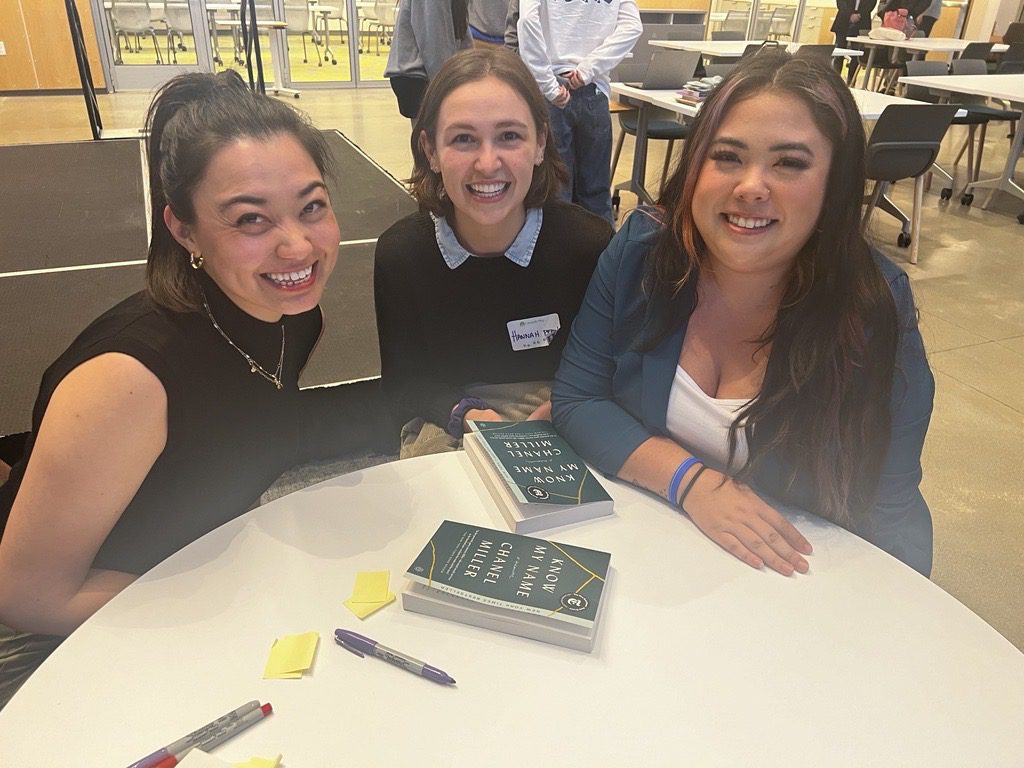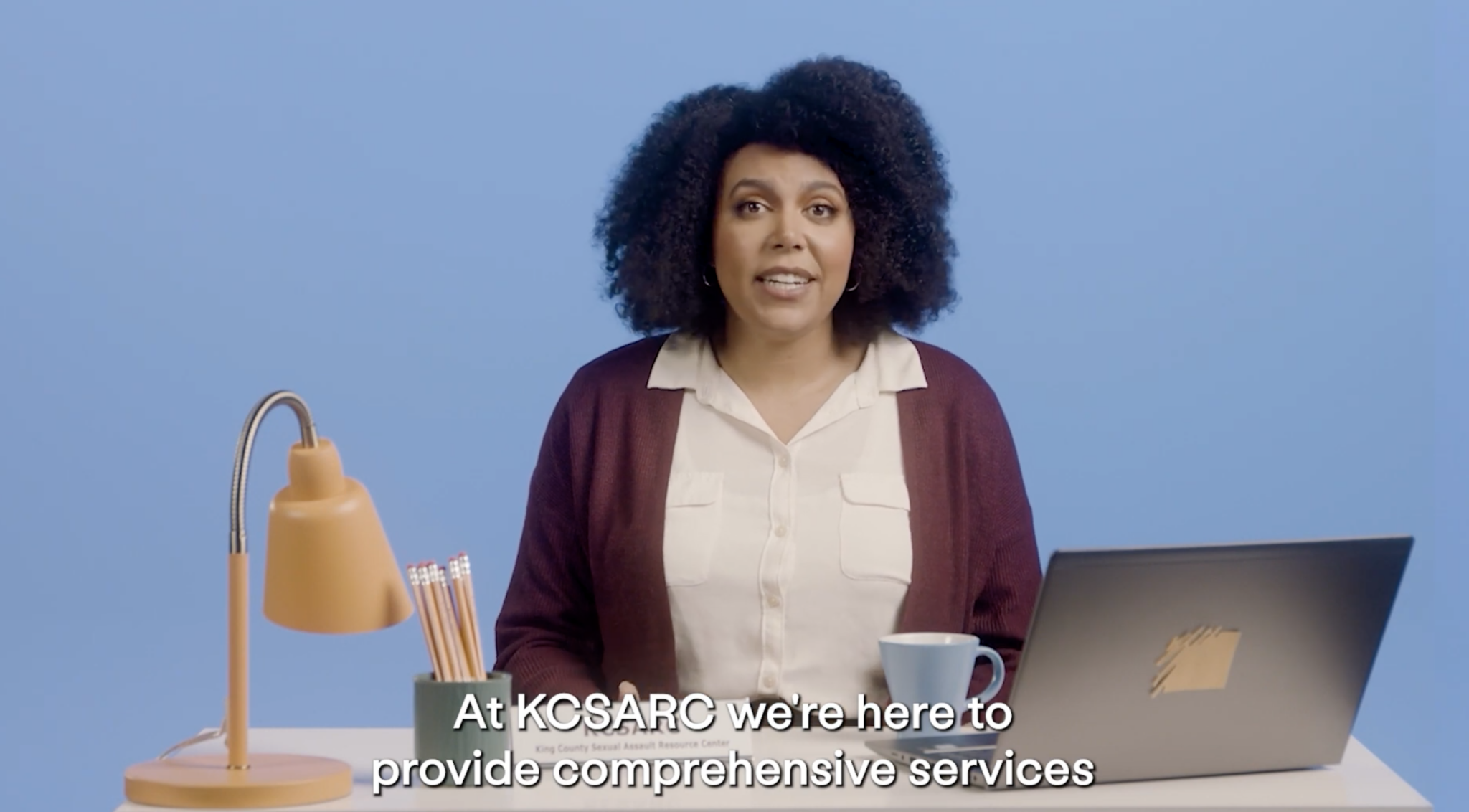
Community Corner highlights the work of Seattle Human Services’ community partners in their own words. Our goal is to gather stories and photos that illustrate their amazing work on behalf of the people of Seattle. This post highlights King County Sexual Assault Resource Center.
What is the role your organization fulfills in your community?
Sexual assault is common, affecting one in five children by the time they turn 18. The CDC estimates that in Washington state, 61% of women and 34% of men experience contact sexual assault in their lifetimes; the risk is even higher for those who identify as transgender or nonbinary.
The trauma of sexual assault is something that can affect a survivor’s mental, physical and behavioral health, their ability to form healthy relationships, remain in school or in the workplace and much more.
But we want every survivor to know that recovery is possible, with support. The King County Sexual Assault Resource Center (KCSARC) assists about 5,000 individual survivors and their family members each year, including a 24-hour Resource Line at 888.99.VOICE for crisis support and information, advocacy to empower survivors with information, resources and referral to further services, such as legal advocacy or therapy and more. All of KCSARC’s advocacy and therapy services are available in both English and Spanish.
How does your partnership with Seattle Human Services (HSD) assist you in that role?
KCSARC’s partnership with the City of Seattle’s HSD is integral to ensuring service access to every survivor, no matter when they choose to speak out. While the number of individuals who have reached out to KCSARC for support has steadily climbed over the years, calls to KCSARC spiked following the global #MeToo movement. Those calls have not abated in the years since. HSD has helped us keep up with this “new normal” level of demand.
What is your organization’s origin story?
King County Rape Relief began in 1976 as a small, volunteer-run community organization based in Renton. At the time, talk of rape and sexual assault were considered taboo—and the silence surrounding it helped conceal its pervasiveness. KCSARC’s first executive director, Mary Ellen Stone, came on board in 1979, leading a staff of three and assisting about 100 survivors a year.
Among KCSARC’s “firsts” was publishing groundbreaking insight on child sexual abuse called “He Told Me Not to Tell,” which gave parents and caregivers practical tools and information about grooming. This publication led to a five-part PBS series on the subject.
In 1989, as its work expanded to include children and youth, the organization changed its name to the King County Sexual Assault Resource Center. KCSARC’s mission is to give voice to victims, their families and communities, create change in beliefs, attitudes, and behaviors about sexual violence, and instill courage for people to speak out about sexual assault.
How has your organization grown or developed in recent years?
KCSARC has continued to respond to the specialized needs of sexual assault survivors over the years, adding family services, case management, and more. The organization has forged partnerships with other community service providers to address the unique needs and circumstances of particularly vulnerable survivors such as youth experiencing homelessness and Latinx survivors.
Community education and outreach has always been part of our work, but KCSARC has recently strengthened our prevention education programming, equipping young people and communities with information and tools needed to change ingrained beliefs, attitudes, and behaviors about sexual assault.
Why is it important for HSD and Seattle taxpayers to invest in community-led work?

Studies show that untreated trauma can have a lasting impact across a lifetime. Untreated trauma can affect a survivor’s physical, mental and behavioral health. It can disrupt relationships and families, schooling and even the ability to self-care. It also carries a heavy financial burden: the CDC estimates the lifetime economic burden of rape is $122,000 per individual. Community-based advocacy means survivors have confidential support and connection to services whenever they are ready to begin their recovery.
How do your programs and services help to reduce the disparities experienced by people of color living in our region?
People who face marginalization due to race or ethnicity are at even greater risk of experiencing sexual violence, and are less likely to be believed when they speak out. Language, cultural norms, and immigration status can all be additional barriers to getting help. KCSARC’s Dando Voz program is staffed by a team of bilingual, bicultural advocates and therapists to remove these barriers. Dando Voz is among our fastest-growing programs, serving 608 survivors last year alone.
In 2023, 25% of our clients identified as Latinx; another 15% identified as Black, and 13% identified as multi-racial. These are higher than these communities’ overall demographic proportions in King County. Survivors who identify as BIPOC may distrust government, medicine and policing systems as rooted in historic racism and oppression. As a confidential, community-based resource, KCSARC provides a trusted alternative for some BIPOC survivors.
What is an example of how an HSD-funded program or service impacted the life of one of your community members?
A history of sexual abuse actually increases the risk for further victimization. That was true for Lyric*, a young survivor experiencing homelessness who had experienced abuse at age five and again at age 14. Lyric was in recovery for fentanyl use, and was just beginning to see a brighter future ahead.
Then she was sexually assaulted for the third time in her short life. She was devastated.
Not knowing where to turn, she disclosed a few days later to a case manager she was working with, who told Lyric about KCSARC. Together they made the call. KCSARC’s advocate provided Lyric support and information about immediate and long-term resources available to her, including how to access a sexual assault medical exam and legal advocacy. Lyric ultimately decided legal advocacy was not right for her, but wanted to be connected with therapy to help address the unresolved trauma. She also sought case management to help her secure housing. Soon after, she moved into transitional housing, a stabilizing factor that both made it possible for her to participate in trauma-specific therapy and continue her work with her substance use counselor. With this support, Lyric feels hopeful about her future once again.
What motivates your staff or keeps you going?
Our staff work every day with survivors and their families who have been through the worst experiences of their lives. Our courageous clients are our biggest inspiration!
